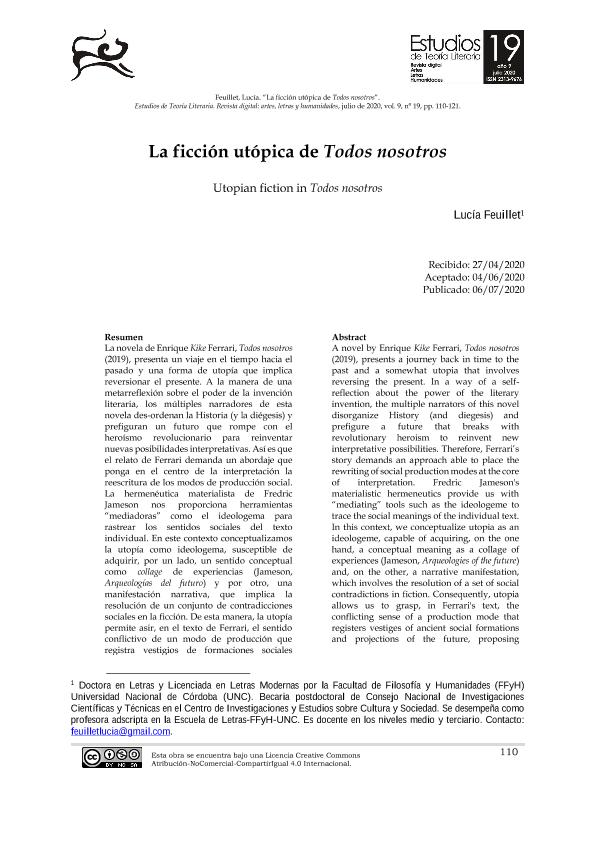Artículo
La novela de Enrique Kike Ferrari, Todos nosotros (2019), presenta un viaje en el tiempo hacia el pasado y una forma de utopía que implica reversionar el presente. A la manera de una metarreflexión sobre el poder de la invención literaria, los múltiples narradores de esta novela des-ordenan la Historia (y la diégesis) y prefiguran un futuro que rompe con el heroísmo revolucionario para reinventar nuevas posibilidades interpretativas. Así es que el relato de Ferrari demanda un abordaje que ponga en el centro de la interpretación la reescritura de los modos de producción social. La hermenéutica materialista de Fredric Jameson nos proporciona herramientas “mediadoras” como el ideologema para rastrear los sentidos sociales del texto individual. En este contexto conceptualizamos la utopía como ideologema, susceptible de adquirir, por un lado, un sentido conceptual como collage de experiencias (Jameson, Arqueologías del futuro) y por otro, una manifestación narrativa, que implica la resolución de un conjunto de contradicciones sociales en la ficción. De esta manera, la utopía permite asir, en el texto de Ferrari, el sentido conflictivo de un modo de producción que registra vestigios de formaciones sociales. A novel by Enrique Kike Ferrari, Todos nosotros (2019), presents a journey back in time to the past and a somewhat utopia that involves reversing the present. In a way of a selfreflection about the power of the literary invention, the multiple narrators of this novel disorganize History (and diegesis) and prefigure a future that breaks with revolutionary heroism to reinvent new interpretative possibilities. Therefore, Ferrari’s story demands an approach able to place the rewriting of social production modes at the core of interpretation. Fredric Jameson's materialistic hermeneutics provide us with “mediating” tools such as the ideologeme to trace the social meanings of the individual text. In this context, we conceptualize utopia as an ideologeme, capable of acquiring, on the one hand, a conceptual meaning as a collage of experiences (Jameson, Arqueologies of the future) and, on the other, a narrative manifestation, which involves the resolution of a set of social contradictions in fiction. Consequently, utopia allows us to grasp, in Ferrari's text, the conflicting sense of a production mode that registers vestiges of ancient social formations and projections of the future, proposing.
La ficción utópica de Todos nosotros
Fecha de publicación:
07/2020
Editorial:
Universidad Nacional de Mar del Plata. Facultad de Humanidades. Departamento de Letras
Revista:
Estudios de Teoría Literaria
ISSN:
2313-9676
Idioma:
Español
Tipo de recurso:
Artículo publicado
Clasificación temática:
Resumen
Palabras clave:
HERMENÉUTICA MATERIALISTA
,
UTOPÍA
,
CIENCIA FICCIÓN
,
LITERATURA ARGENTINA
Archivos asociados
Licencia
Identificadores
Colecciones
Articulos(CIECS)
Articulos de CENTRO DE INVESTIGACIONES Y ESTUDIO SOBRE CULTURA Y SOCIEDAD
Articulos de CENTRO DE INVESTIGACIONES Y ESTUDIO SOBRE CULTURA Y SOCIEDAD
Citación
Feuillet, Lucía; La ficción utópica de Todos nosotros; Universidad Nacional de Mar del Plata. Facultad de Humanidades. Departamento de Letras; Estudios de Teoría Literaria; 9; 19; 7-2020; 110-121
Compartir




